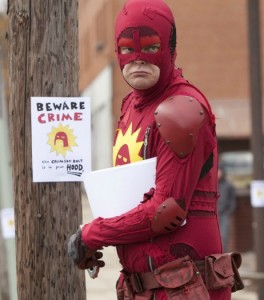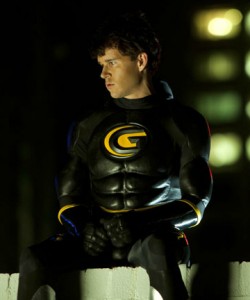 By Greg Smith
By Greg Smith
At Agile Writers we are guided by the principles of storytelling that were exposed by Joseph Campbell in The Hero With A Thousand Faces. In it, a hero (the central character) has a missing inner quality and must go on a journey to discover that quality and satisfy it. The hero starts out in his ordinary world where “something happens” that pushes him into some other “special world” where he meets friends and enemies. He accomplishes some goal and in so doing he fulfills his missing inner quality.
The classic super hero story is often just such a journey. The hero has some character flaw that is exposed early in the story. The hero attains a power that throws him into a special world of being “super.” He spends the next part of the story learning how to master the power. By the end of the first 30 minutes of the film, our hero has mastered his powers and he has an enemy to overcome. Meanwhile, we’ve also learned that the hero has a severe inner pain that must be salved. And we’re off.
Today I’d like to look at three very similar films. These films depict ordinary people who take up the cause of the super hero and attempt to right the wrongs of society from behind the mask.
In Kick-Ass (2010) we meet young Dave Lizewski (Aaron Johnson) who has all the problems of the typical teenager. He wants to meet girls, he gets his lunch money stolen by older boys, and he feels powerless in a world of adults. Dave becomes so tired of being a victim and of watching  others play the victim that he dons a green scuba outfit and becomes Kick-Ass the crime fighter. He confronts the local hoodlums who quickly stab him and throw him under a bus. Dave undergoes multiple surgeries to reinforce his bones with steel and as a result of his accident he has a reduced sensation to pain. He befriends other local self-made heroes and takes on the crime syndicate.
others play the victim that he dons a green scuba outfit and becomes Kick-Ass the crime fighter. He confronts the local hoodlums who quickly stab him and throw him under a bus. Dave undergoes multiple surgeries to reinforce his bones with steel and as a result of his accident he has a reduced sensation to pain. He befriends other local self-made heroes and takes on the crime syndicate.
In Super (2010) we’re introduced to Frank Darbo (Rain Wilson) who is a thirty-something short order cook. He’s done little with his life – so little in fact that the two main events of his life are getting married to his lovely wife (Liv Tyler) and pointing out a thief at a fruit stand. His recovering addict wife of seven years leaves him for Jacques (Kevin Bacon) who supplies her with drugs. Frank becomes inspired by watching late night Christian broadcasts depicting a super hero who leads children away from the devil and into a life of righteous living. Frank decides that he is going to recover his wife by becoming the Crimson Bolt. He befriends a young girl who clerks at the local comic-book store and together they take on the local drug syndicate.
From Australia comes Griff the Invisible (2010), the story of an ordinary office worker who believes that he has harnessed the power of invisibility. Griff (Ryan Kwanten) dons a black scuba suit and lurks around at night looking for evil-doers. Along the way he meets a pretty girl who recognizes Griff for his ability to maintain a child-like innocence and sense of wonder.
What these characters have in common is a sense of powerlessness. They feel so powerless, in fact, that the only way they can overcome it is if they cocoon themselves in garb and mask and change their identities.
 Unlike the super heroes of comics and film, they aren’t hiding their identities to protect those they love, but to protect themselves from detection. Once hidden, they are able to distance themselves from the limitations they feel when they are their ordinary selves.
Unlike the super heroes of comics and film, they aren’t hiding their identities to protect those they love, but to protect themselves from detection. Once hidden, they are able to distance themselves from the limitations they feel when they are their ordinary selves.
And that is the message of these films. We each have the capacity to go beyond who and what we are right now. The things that often hold us down are the preconceptions that we have about ourselves, and the prejudging that others impose upon us. When these heroes don the mask and cape, they isolate and separate themselves from these limitations. They are telling us that when we ignore the ties that society uses to bind us, and we unleash ourselves from our self-imposed limitations, we each become super.
Kick-Ass, Super, and Griff all follow super hero patterns that you’ll recognize. There is an origin story, the definition of the villain, a pretty girl to acquire, a deep disappointment followed by a gathering storm and finally a climactic battle to set things right. What is different about these films from other super hero films is that in the end, each hero returns to his origin: ordinary, healed, and newly super.
– – – – – – – – –
This essay is reprinted from Matthew Killorin’s excellent Capes on Film blog. Greg Smith founded Agile Writers in 2011 with the mission to discover a method for helping beginning writers complete a first-draft novel in 6 months. The Agile Writer Method is based upon the writings of experts in mythology, screenwriting, and psychology. His seminars on the Agile Writer Method have delighted hundreds of writers, scholars, and university students. In 2012 Agile Writers completed 12 first draft novels, 5 published novels, and two members of the Workshop have been nominated for the coveted James River Writer Best Unpublished Novel Contest.
Interesting post – it dawned on me while reading that the golden age for superheroes was with the comic book boom of the 50’s and 60’s. There has been a bit of a big-screen revival over the past decade with Ironman, but for the most part, the ‘superheroes’ of the 80’s and 90’s were Professional Wrestlers.
Thanks for this post – it was a fun read.
There are some interesting ideas here. Superheroes have many reasons for adopting a secret identity (those that have them), from protecting their family, like Spider-Man, making an end run around a promise, like Daredevil, or just the need to have a normal life, like Superman. But the adoption of a heroic identity as a metaphor for self-reinvention is a rich concept. In real life, many people take the opportunity to reinvent themselves by going off to college or moving to a new city or taking a new job or getting married– a few go so far as to change their names. While this can be seen as a matter of low self-esteem, there can also be a redemptive quality to it. The desire to better oneself can ultimately only be a good thing.